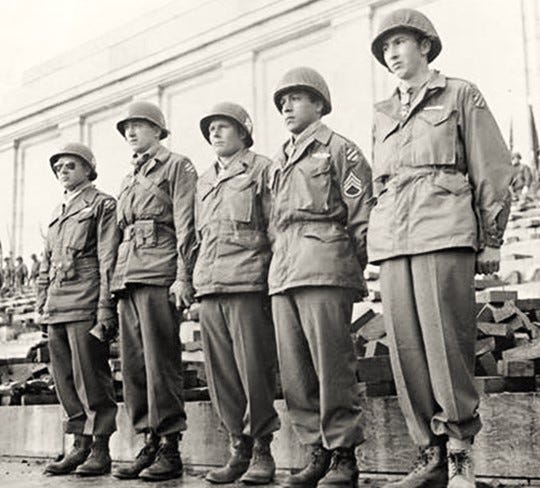From an early age, Technical Sergeant Russell Dunham had little choice but to fend for himself.
At 7 years old, his mother died – leaving him and his brother alone with their taskmaster father – and, at 16, both boys had to leave their Illinois family farm to find work during the Great Depression.
As the Depression came to an end in 1939, work still proved hard to come by, and so, rather than search for what Russell referred to as, “anymore dead-end jobs”, he decided to enlist as a soldier.
Attached to the famed 3rd “Rock of the Marne” Infantry Division, he shipped out with the latter, first, to North Africa, where he was awarded the Bronze Star for his “valorous conduct”, and then, to Sicily and mainland Italy, where he received the Silver Star for his “leadership in battle.”

Following the Allied invasion of southern France in August 1944, Russell and his company were ordered to secure a German strongpoint near the French town of Kayserberg – “Hill 616" – where, after he and his platoon shattered the Germans' first line of defense on this day in 1945, they found themselves front and center of an overwhelming counter-offensive.

Having determined that three well-entrenched machine gun nests posed the greatest threat to him and his men, Russell resolved that he “needed to take care of them.”
To that end, he donned a snow-white mattress cover for camouflage; picked up a dozen hand grenades, an M1 Carbine, and 12 magazines of ammunition, and, with no regard for his own safety, proceeded to advance – alone – towards the Germans’ position.
Crawling over 75 yards under relentless fire, remarkably, Russell made it to his first target unscathed.
When he sprang to his feet to attack it, though, he was almost immediately struck in the back by a sniper’s bullet, and thrown some 15 yards down the hill by its impact.
Notwithstanding the excruciating pain of his wound, somehow, he found the strength to overcome it.
In so doing, he renewed his daring one-man assault against the three machine gun emplacements and, when he reached them, incredibly, succeeded in neutralizing their crews; capturing their equipment; and taking 20 of their number prisoner.
Although Russell didn’t know it at the time, his fearless solo mission not only saved the lives of 150 of his fellow soldiers but, it also won him the United States’ highest military accolade – The Medal of Honor.
Prior to being presented with it, he spent several weeks recovering in a field hospital, from where, he insisted on returning to his unit on the front line.

Despite then being rightly hailed a hero upon his return home at the war’s end, Russell humbly maintained that he was “no such thing” throughout his post-war life.
“You said what I did was heroic”, he expressed, mere months before his passing aged 89 in 2009.
“But I say, all I did is what any sergeant would have done for his men – I went up that hill, 'cause I knew that that was the only way I could save them.”




